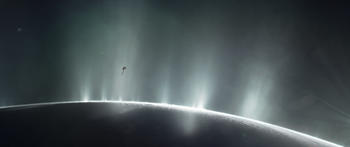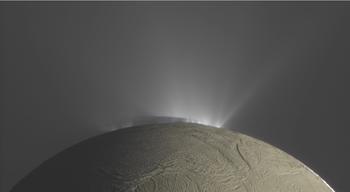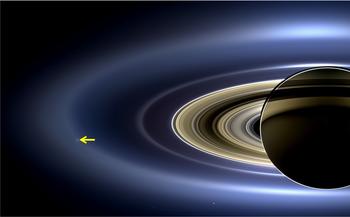New Discovery of Phosphorous in the Subsurface Ocean of Enceladus as a Boost for its Habitability Published in Nature
This illustration shows NASA's Cassini spacecraft diving through the plume of Saturn's moon Enceladus, in 2015.
Image Credit: NASA/JPL-Caltech
Through cracks in the ice crust of Enceladus, icy cryovolcanic jets erupt into space. The ice grains are generated from the global ocean under the ice layer that is a few kilometers thick.
Image Credit: NASA/JPL-Caltech/SSI/Kevin M. Gill
Image taken by NASA’s Cassini spacecraft showing Saturn’s rings in its full glory. The arrow is pointing at Enceladus orbiting Saturn embedded in the E ring which is created by ice grains emitted by Enceladus’ plume into space.
Image Credit: NASA/JPL-Caltech/SSI
News from Jun 14, 2023
A team of researchers from Freie Universität Berlin led by Professor Frank Postberg, together with international collaborators, has discovered phosphorus in ice grains emitted by Saturn’s moon Enceladus, originating from its subsurface ocean. Phosphorus is one of the six essential elements for life, known as CHNOPS (Carbon, Hydrogen, Nitrogen, Oxygen, Phosphorus and Sulfur) that has evaded detection in Enceladus’ cryovolcanic plume… until now. Using data from the Cosmic Dust Analyzer, the researchers detected the phosphorus in the form of phosphates within ice grains believed to be frozen ocean droplets emitted into space. They inferred phosphate concentrations which are more than 100 times higher than in Earth’s oceans.
Although there is currently no evidence that the ocean is actually inhabited, this new discovery makes Enceladus’ ocean the place with the most favorable conditions for the emergence of life in our solar system outside the Earth. The article is published in the journal Nature on June 14th.
Further Information:
» Download Nature Paper "Detection of phosphates originating from Enceladus’s ocean"
» Project Website Habitat-Oasis
Contact:
• Prof. Dr. Frank Postberg (FU Berlin)
• Dr. Nozair Khawaja (FU Berlin)
• Dr. Fabian Klenner (Seattle, USA)




